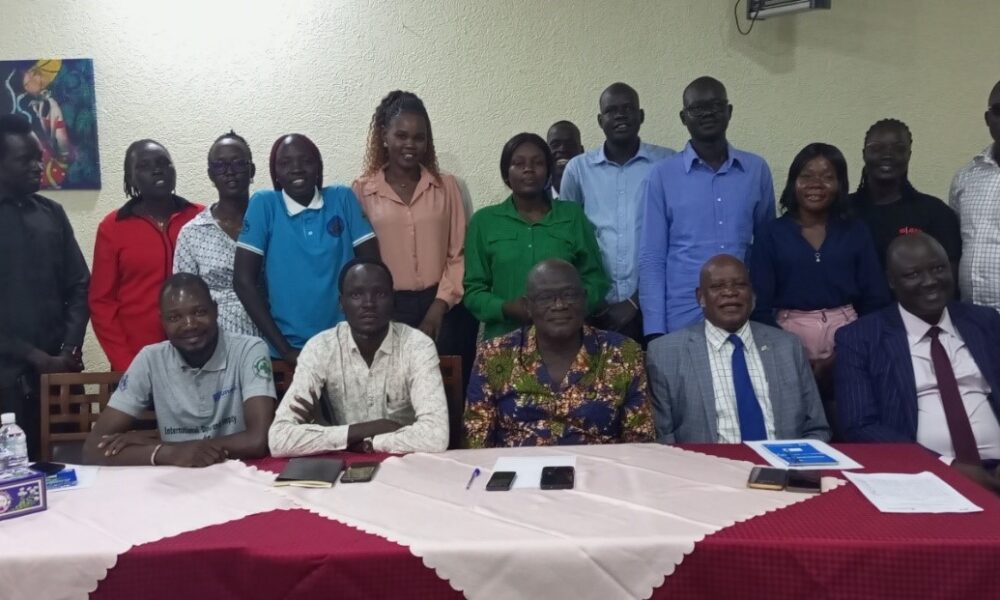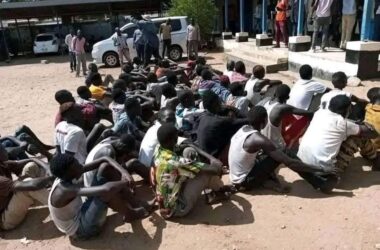By Yiep Joseph
Protection of journalists and accuracy of their reporting were key topics at a meeting between the Union of Journalists of South Sudan (UJOSS) and government stakeholders.
As South Sudan engages in civic education ahead of the 2026 general elections, the media has a crucial role to play, similar to other branches of government.
In line with fostering civic space across the country, UJOSS organized its second breakfast meeting with key government stakeholders on Friday.
The meeting, held under the theme, “The Role of Media in Expanding Civic Education and Public Consultation Ahead of the Anticipated General Elections in South Sudan,” brought together numerous journalists and government officials to define their respective roles.
In his opening remarks, Sapana Abuyi, Director General for Information and Media Compliance at the Media Authority, emphasized that the meeting aimed to strengthen collaboration between the media and the government to ensure informed, inclusive, and peaceful elections.
Abuyi reiterated the Media Authority’s commitment to ensuring the protection of journalists while they carry out their duties.
“What is important is the safety of journalists, and we shall make sure that journalists are protected while doing their jobs,” he stated.
In adherence to ethical standards, he urged journalists to remain neutral in their reporting to ensure balanced stories.
He added that the Media Authority continues to engage with various stakeholders to ensure that the media can play its role without interference.
Abuyi reaffirmed the Authority’s readiness to improve journalists’ working conditions during the election period, including the creation of media centers to facilitate easy access to the internet and other necessary services.
Oliver Mori Benjamin, Spokesperson of the National Transitional Legislative Assembly (NTLA), commended the Union of Journalists for their continuous efforts in improving working relations between the government and journalists.
He revealed that the elections remain scheduled for 2026 and urged journalists to hone their skills for accurate reporting.
Mori encouraged journalists to commit to informing the public with available information, particularly regarding the implementation of the peace agreement and steps toward the elections.
He reaffirmed the government’s commitment to the protection of journalists and the provision of necessary information for public consumption.
The spokesperson added that, as part of protecting journalists and creating a conducive environment for them, parliament remains accessible at any time to respond and provide necessary information.
He appealed to journalists to redouble their efforts in ensuring neutrality in their reporting, noting the prevalence of online users misleading the public.
Oyet Patric, President of the Union of Journalists of South Sudan (UJOSS) and a member of the National Constitutional Review Commission (NCRC), appealed to journalists to continue their efforts in ensuring that information reaches the public.
He applauded journalists for their work in informing the public about activities surrounding the 2018 peace agreement.
Oyet stressed that for civic education to succeed, journalists and media institutions, in general, need to work together.
He added that the Union of Journalists remains committed to ensuring that journalists are protected and trained to work in line with the ethics of their profession.
Role of Media in Civic Space and Elections
The media plays a crucial role in disseminating information to the public, especially during elections. It is responsible for delivering important news, updates, and candidate profiles to voters, ensuring they are well-informed before casting their votes. Through various channels such as TV, radio, newspapers, and online platforms, the media ensures that voters have access to relevant information about candidates, the election process, and voting procedures.
The media also acts as a watchdog during elections, reporting any misconduct, corruption, or unethical practices by political parties or candidates.
By providing accurate and timely information, the media helps in shaping public opinion and influencing voter behavior.
It plays a vital role in holding political leaders accountable and ensuring transparency in the electoral process.




